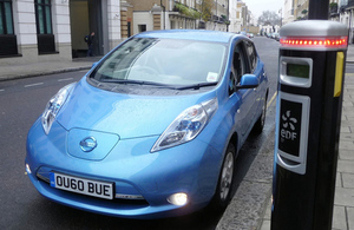A system of road pricing varying by time and location would be ‘the ideal approach’ in the face of falling revenue from existing sources, public finance experts have said.
In a new report, the Institute for Fiscal Studies (IFS) warned that with revenue from fuel duties down by £19bn – nearly 1% of national income – since 2000 a further £28bn could still to be lost ‘if we don’t act soon’.
It warned that a possible 2p per litre cut in fuel duty, which prime minister Boris Johnson is said to be pressing for in the upcoming Budget, would cost £1bn a year in lost revenue on top of the £5.5bn lost since 2010–11 from the failure to increase rates in line with CPI inflation.

The shift to electric vehicles will see a fall in fuel duty
Revenue from fuel duties is now £28bn a year – 1.3% of national income having peaked at 2.2% of national income in 1999/2000. Had it remained at that level, the exchequer would currently be getting an extra £19bn, the IFS said.
But it warned that the Government’s commitment to reaching zero net emissions by 2050 means that revenue from fuel duties will completely disappear over the next few decades, presenting ‘a huge long-run fiscal challenge’ and a further economic and social challenge.
It said taxes on motoring help to correct for the social costs of driving which include greenhouse gas emissions, local air pollution, noise, crashes, damage to infrastructure and congestion, which is by far the biggest cost and will remain after the transition to electric cars.
Rebekah Stroud, co-author of the report and a research economist at the IFS, said: ‘The Government should set out its long-term plan for taxing driving, before it finds itself with virtually no revenues from driving and no way to correct for the costs – most importantly congestion – that driving imposes on others.’
The IFS said new taxes should be designed that can gradually replace fuel duties.
‘These should reflect at least distance driven, and ideally vary according to when and where journeys take place. Those driving in busy places would pay more, but the majority of journeys would be taxed less heavily than at present.’
It said there is an advantage in acting quickly as it will be much harder politically to introduce such taxes only after revenue from fuel duties has fallen much further and many people are driving hybrid or electric cars in the expectation of paying little tax on them.
The findings come from a chapter entitled ‘A road map for motoring taxation’ in the IFS Green Budget. Key findings include:
- To effectively correct for the social costs of motoring we need to look beyond existing taxes. The ideal approach would be a system of road pricing with charges varying by time and location. Failing that there is a case for introducing a flat rate tax per mile driven;
- Fuel duties take about the same fraction of the budget of low, middle and high-income households on average. However, looking only at households with a car, fuel duties take more of the budget of low-income drivers;
- Fuel taxes account for more than 10% of the (non-housing) spending of about one household in 20, producing ‘a heavy burden for those who have little choice over how much they drive’;
- The only justification for retaining the annual vehicle excise duty (VED) on car ownership is if the Government rules out using fuel duties to raise revenue in its place. Similarly, company car tax should not be linked to emissions if the Government can set fuel taxes and the VED ‘showroom tax’ appropriately.
Register now for full access
Register just once to get unrestricted, real-time coverage of the issues and challenges facing UK transport and highways engineers.
Full website content includes the latest news, exclusive commentary from leading industry figures and detailed topical analysis of the highways, transportation, environment and place-shaping sectors.
Use the link below to register your details for full, free access.
Already a registered? Login